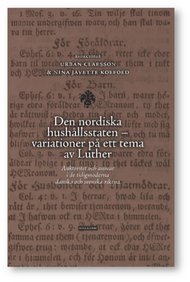
Urban Claesson & Nina J. Koefoed (eds): Den nordiska hushållsstaten: Variationer på ett tema av Luther. Auktoritet och ansvar i de tidigmoderna danska och svenska rikena [trans: The Nordic Household State: Variations on a Theme by Luther. Authority and Responsibility in the Early Modern Danish and Swedish Realms.] Stockholm: Makadam Förlag 2024.
According to the book, Martin Luther's view of society as a household led by parents established a model of social organisation that became widespread in the Nordic countries in the 17th and 18th centuries. The book introduces the household as an analytical concept, partly to describe a theologically grounded state that was both organised as a household and consisted of, and was based on, small households. And partly to capture the fact that what the book calls household culture shaped both the individual household and the state as a whole. The studies combine research from Denmark and Sweden and offer comparative perspectives on the organisation of the household in each realm. Since the 16th century, both the Swedish and the Danish household states have been in conflict and have shared a Lutheran confession. There are both similarities and differences between the two kingdoms. For example, it is a common Nordic feature that households were not run by fathers alone, but by both parents.
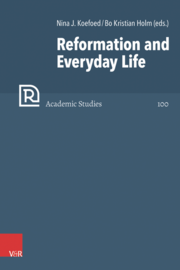
Nina Javette Kofoed and Bo Holm (Eds.): Reformation and Everyday Life. Göttingen: Vandenhoeck & Ruprecht Verlag 2023.
The European reformations meant major changes in theology, religion, and everyday life. Some changes were immediate and visible in a number of countries: monasteries were dissolved, new liturgies were introduced, and married pastors were ordained, others were more hidden. Theologically, as well as practically the position of the church in the society changed dramatically, but differently according to confession and political differences. This volume addresses the question of how the theological, liturgical, and organizational changes changes brought by the reformation within different confessional cultures throughout Europe influenced the everyday life of ordinary people within the church and within society. The different contributions in the book ask how lived religion, space, and everyday life were formed in the aftermath of the reformation, and how we can trace changes in material culture, in emotions, in social structures, in culture, which may be linked to the reformation and the development of confessional cultures.
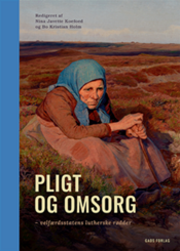
Nina J. Koefoed and Bo K. Holm (red.): Pligt og omsorg - Velfærdsstatens lutherske rødder. København: Gads Forlag, 2021
The church and the Lutheran faith have historically played a significantly greater role for the Danish population than it does today. Pligt og omsorg [Duty and care] shows how the Christian cultural heritage and Lutheran theology have influenced Danish society in areas that we do not immediately understand as religious. And the book provides the background for our notions of authority, social responsibility, duty, work, the poor and care.
The modern Danish society has Lutheran roots - roots that have nourished our understanding of the welfare state's basic principles of social services, free education, equality and family policy. In this way, the book contributes to a deeper understanding of Danes' trust in the welfare state.
The book takes the form of a monograph with five authors: Sasja E.M. Stopa, Maria N. Pedersen, Gorm Harste, Bo K. Holm (ed.) and Nina J. Koefoed (ed.).
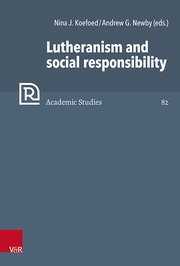
Nina Javette Kofoed and Andrew G. Newby (Eds.): Lutheranism and social responsibility. Göttingen: Vandenhoeck & Ruprecht Verlag, 2022
The contributions in this volume enter the debate about the way in which the provision of poor relief can be influenced by its national confessional context.
The book investigates what the obligation to care for the poor meant in a Lutheran context, how this obligation was carried out in Nordic countries, and how the obligation transformed in the nineteenth century with the modernization and democratization which produced the Nordic welfare states. In several case studies, the book also analyses the implementation of social responsibility of the authority towards different categories of poor (‘deserving’ and ‘undeserving’), local administration and centralization of poor relief through connections of public and private sources of funding, and collaboration between state, church and civil society through different public and private aspects of poor relief.
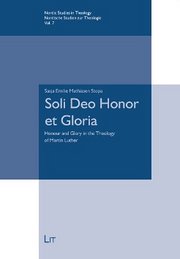
Sasja Emilie Mathiasen Stopa: Soli Deo Honor et Gloria: Honour and Glory in the Theology of Martin Luther. Nordic Studies in Theology / Nordische Studien zur Theologie, Berlin: LIT Verlag, 2021.
Sasja E.M. Stopa explores the influence of honour and glory on Martin Luther’s theology. Luther’s works overflow with terminology of honour and glory. Analysing a broad selection of this terminology, Stopa argues that his doctrine of justification centres on a soteriological concern for the recreation of human glory lost in the Fall and a doxological concern for God’s glory stolen by sinners. Stopa shows how this relation to God patterns Luther’s understanding of social relations, and discusses justification as a process of mutual recognition translating Luther’s theology of glory into contemporary theology.
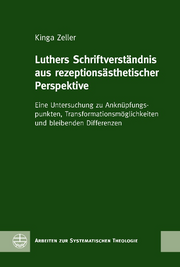
Since more than 200 years Protestant Theology suffers from the so-called »crisis of the Scriptural principle«: all Christian doctrine should derive from Scripture alone, yet in the light of historical-critical exegesis that very Scripture has been proven to be man-written and to consist of many scriptures with different theologies. While theories and hermeneutical insights focusing on the production of texts hence lead to doctrinal deconstruction, theories of text reception provide approaches to overcome the crisis of the Scriptural principle and have significant connections to motives of reformational scriptural hermeneutics, too. Yet, their fitting has not been sufficiently researched so far. In the present work Kinga Zeller first reconstructs Luther’s understanding of Scripture. Second, she compares aspects of Luther’s approach to insights and premises of reception theories, particularly that of Wolfgang Iser. As result, the investigation highlights connecting factors, possible transformations, and remaining differences between reception theories and Luther’s understanding of Scripture as well as it presents fundamental elements of a reception-theoretically oriented and reformationally based doctrine of Scripture. Thereby the study contributes to Luther research as well as to research of biblical hermeneutics.
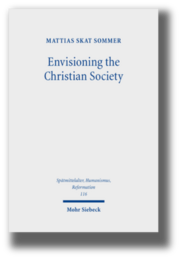
Mattias Skat Sommer: Envisioning the Christian Society. Niels Hemmingsen (1513–1600) and the Ordering of Sixteenth-Century Denmark. Spätmittelalter, Humanismus, Reformation 116. Tübingen: Mohr Siebeck 2020.
Niels Hemmingsen (1513–1600) is one of the most influential Danish theologians in history. As a professor at the University of Copenhagen, Hemmingsen played an important role in molding Danish society according to his understanding of Lutheranism during the second half of the sixteenth century. Drawing on sociology of knowledge, cultural memory, and confessional culture, Mattias Skat Sommer examines Hemmingsen’s works and life in political and theological contexts. By studying Hemmingsen’s role in forming a discourse of social interaction, the author argues that Hemmingsen was the leading agent in shaping post-Reformation Danish confessionalization. In doing so, Sommer emphasises the fluid boundaries of the Danish Reformation and adjusts two prominent theoretical frameworks discussed in contemporary research on early modern Europe, namely those of confessionalization and confessional culture.
Sasja Emilie Mathiasen Stopa: Ære. Tænkepauser 78. Aarhus: Aarhus Universitetsforlag, 2020.
Bogen undersøger æresbegrebet; hvordan æren har forandret sig gennem historien, og hvilken rolle den spiller i det moderne samfund, hvor begrebet ofte optræder under dæknavne som anerkendelse, respekt eller værdighed. Spørgsmålet om, hvordan man opnår ære eller social anerkendelse er et af de allermest grundlæggende spørgsmål ved menneskelivet. I sociale fællesskaber etablerer forskellige normer for tildeling af ære eller anseelse en bestemt orden. Den aggressive adfærd, der giver respekt i en rockerklub, ville betyde omgående hjemsendelse fra onsdagskaffen i en mødregruppe. Men ære handler også om menneskets allerinderste værdighed, der kan krænkes, og om skammen som et grundvilkår, som mennesket forsøger at dække over ved at jagte stilling, status og rigdom. Bogen fortæller historien om æresbegrebets udvikling fra den bibelske myte om Adam og Evas syndefald, der handler om at miste sin ære og blive udskammet af fællesskabet, over feudalsamfundets familiebårne æresforståelse, aristokratisk dovenskab og dueller versus borgerskabets arbejdsomme stræben og til nutidens debatter om krænkelseskultur og identitetspolitik.
Rasmus Skovgaard Jakobsen: Nobility between God and People After the Reformation. The Ideology of the Danish Nobility Under the Reign of the Aristocracy as seen through the Published Noble Death Sermons. Aarhus University, 2019
This dissertation studies the role of the Danish nobility in communicating the messages of the Reformation in the first half of the Confessional Epoch (c. 1550-1617). The study is based on death sermons for the Danish nobility published during this period, and demonstrates that the nobility framed themselves, their lineage and the aristocracy as Lutheran authorities who had been sanctioned by God. This claim to legitimacy depended on the performance of a number of Lutheran duties relating to poor relief and educational and church support. The nobility had to carry out these duties on their estates in order to gain acceptance of their legitimacy by society at large. In this way, the Danish nobility played a central role in communicating the messages of the Reformation in their local communities.
Bo Kristian Holm, Nina Javette Koefoed og Sasja Emilie Mathiasen Stopa (Red.): Religion som forklaring? Kirke og religion i stat og samfund. Festskrift til Per Ingesman.
This is a commemorative volume in Danish to the danish researcher Per Ingesman. Religion as an explanation? explores the role of religion in Denmark on the foundation of the research, which Per Ingesman has established during his career to our greater understanding of the role of religion in society. The book has 20 contributors, who reflects on subjects ranging from the influence of court priests during the reign of Christian the third, pope letters to the Nordic countries in the Middle Ages, adultery as a spiritual phenomenon in the 13th century Denmark and the abolishment of fall confirmations in Aarhus in the 1950s.
Bo Kristian Holmog Nina J. Kofoed: Lutheran Theology and the shaping of society: The Danish Monarchy as Example
From different perspectives this book studies the role of Reformation theology in the shaping of Danish society and the social dimensions of Lutheran confessional culture. The book develops an approach making it possible to draw strong conclusion about the social teaching of Luther and its impact on the development of the Danish society.
Gorm Harste: Critique of the sense of war (Danish, with English summary)
Gorm Harste defended this work as doctoral dissertation at the University of Copenhagen 1 December 2016. The work analyze the development of war historically and theoretically from the crusade in the long 13th century until George W. Bush’s so called “crusade” at the beginning of the 21th century.
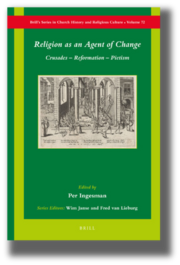
Per Ingesman (ed.): Religion as an Agent of Change, Leiden: Brill, 2016
Per Ingesman, professor in church history at Aarhus University, have edited this book, Religion as an Agent of Change: Crusades - Reformation - Pietism, which was published by Brill February 2016. The books contribution discusses how the christian religion has changed society, created new cultures and proven to shape identity on those who have practiced it.
The book contains contributions from Arne Bugge Amundsen, Ole Peter Grell, Martin H. Jung, Thomas Kaufmann, Fred van Lieburg, Christoph T. Maier, Peter Marshall, Hugh McLeod, Jonathan Phillips, Felicitas Schmieder and John Wolffe.
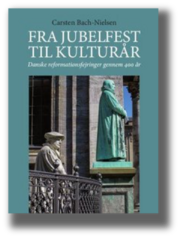
Carsten Bach-Nielsen: Fra jubelfest til kulturår: Danske reformationsfejringer gennem 400 år, Aarhus: Aarhus Universitetsforlag, 2015
This danish book (From jubilee to cultural year: Danish reformation celebrations through 400 years), published at Aarhus University Press, 2015 as a contribution before the reformation jubilee in 2017. The author, danish church and art historian Carsten Bach-Nielsen walks the reader through 400 years of celebrations of Luther and the reformation.
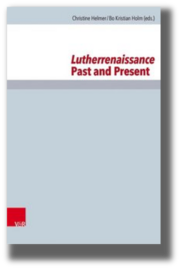
Christine Helmer & Bo Kristian Holm (ed.): Lutherrenaissance: Past and Present, Göttingen: Vandenhoeck und Ruprecht, 2015
The great flourishing of interest in Luther’s religious experience and thought in Berlin at the turn of the twentieth century was known as the Lutherrenaissance, an extraordinarily generative moment of scholarly creativity within the Lutheran tradition. Thinkers such as Holl, Harnack and Otto took up questions that would reverberate throughout twentieth century religious and theological inquiry, on the nature of history, for instance, dialectical theology, and the question of mysticism in religious experience. The Lutherrenaissance also planted the seeds of a political theology that contributed to the alliance of Lutheran theologians with National Socialism. Contributors to this volume, attentive to both to the rich contributions of the Lutherrenaissance and its darker consequences, open an unprecedented conversation across the century. Contributors aim to bring the critical insights of that period to bear on key questions in the study of religion and theology today, with particular attention to the global context within which present day scholars work.
Authors: Heinrich Assel, Christine Põder, Peter Widmann, Else Marie Wiberg Pedersen, Peter Grove, Bo Kristian Holm, Jörg Lauster, Ronald F. Thiemann, Christine Helmer, Marit Trelstad og Allen G. Jorgenson.
Editors: Christine Helmer, Northwestern, Evanston, IL & Bo Kristian Holm, Aarhus.
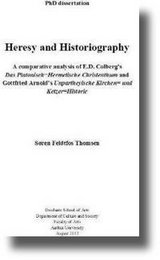
Søren Feldtfos Thomsen: Heresy and Historiography (PhD dissertation)
The dissertation is a comparative study of two church histories: Das Platonisch=Hermetische Christenthum (1690/1691) by Lutheran orthodox theologian and church historian Ehregott Daniel Colberg (1659-1698) and the Unpartheyische Kirchen= und Ketzer=Historie (1699/1700) by radical pietistic theologian and church historian Gottfried Arnold (1666-1714). The analysis is intended to elucidate the texts’ negotiation of the relationship between historical criticism and religious ideology in the portrayals of Reformation and post-Reformation groups and individuals traditionally perceived as heretical, such as the Anabaptists and the Quakers. The goal is thus to contribute to a fuller understanding of the relationship between critical, comparative historiography and religious apologetics and polemics in the Protestant historiographical and heresiological literature of the German Frühaufklärung.
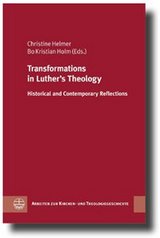
Christine Helmer & Bo Kristian Holm (eds.): Transformations in Luther’s Theology. Historical and Contemporary Reflections, Leipzig: Evangelische Verlagsanstalt Leipzig, 2011
New research on Luther focuses on his exciting potential to be a dialogue partner for religion and theology today. This edited collection considers how Luther’s most important reformation-theological insights have been interpreted and understood throughout the past century and how his key theological ideas can be recontextualized by contemporary global issues.
Luther’s theology is ultimately relevant to the political, economic, and justice-dimensions of human flourishing.
Contributions to the book are written by Philipp Stoellger, Friederike Nüssel, Heinrich Assel, Paul R. Hinlicky, Christine Helmer, Peter Widmann, Risto Saarinen, Jan-Olav Henriksen, Michael Welker, Hartmut Rosenau, Elisabeth Gerle, Vítor Westhelle og Svend Andersen. Christine Helmer and Bo Holm have written the introduction.
Leipzig: Evangelische Verlagsanstalt Leipzig 2011
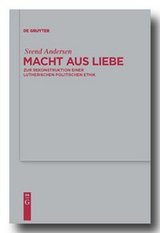
Svend Andersen: Macht aus liebe, Berlin - New York: de Gruyter, 2010
The relationship between religion and politics has received increased attention in recent time. For religious traditions, this increased attention has been cause to reflect on their position regarding political life. Is it permissible for a religious person to engage in political life at all? Should he or she attempt to impose his religious views on the entire society? This book deals with Luther’s reflections on the relation between his religious views and politics. Luther understands political authority as a reflecting a God-given natural order. Christians are called to practice neighborly love also in political life. In Luther’s view, politics consists in the conversion of love into power. Can this idea still be defended today?
“[...] dieses Buch, dessen Verdienst ohne Zweifel darin besteht, die theologische Frage nach einer politischen Ethik in großer Klarheit in die gegenwärtige Diskussion einzubringen.“
Michael Coors in: Theologische Literaturzeitung 136/2 (2011)
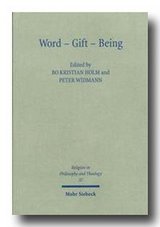
Bo Kristian Holm & Peter Widmann (eds.): Word – Gift – Being, Tübingen: Mohr Siebeck, 2009
Focusing on the relationship between justification, gift-economy and ontology, this volume addresses fundamental issues in contemporary Reformation theology with an impact on the understanding of creation theology, human passivity/activity, self-giving, the concept of excess, and generosity. This volume brings the discussion of the role of studies in exchanging gifts into a Lutheran context, offering necessary clarifications on Lutheran thinking and Lutheran perspectives on existing discussions in other traditions. With its focus on gift-economy and ontology, this volume provides new perspectives on the core of Lutheran theology and identifies the crucial issues.
“[...] this volume is bound to have an important role in postmodern Lutheran theology.”
Mark Mattes in: Lutheran Quarterly XXV (2011)
„ [...] diese sorgfältig dokumentierte Forschungsdiskurs [öffnet] neue und fruchtbare Fragehinsichten [...]“
Heinrich Assel in: Theologische Literaturzeitung 136/6 (2011)
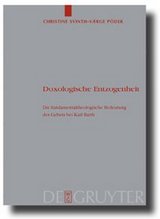
Christine Svinth-Værge Põder: Doxologische Entzogenheit, Berlin – New York: de Gruyter, 2009
This study advances the thesis that prayer can be understood as the key to the fundamental structures of Karl Barth's Church Dogmatics. A particular focus is on the question of how humans are to be perceived as active and receptive subjects in the encounter with God. In the development of the argument, therefore, a key function is attributed to the concept of reciprocity. In this horizon, the relationship is analysed between the petition - which for Barth is central - and the response (as a realisation of the divine relationship). In this, the encounter with God is realised positively through the petition expressing human neediness by the prayer turning into praise. Here, a fundamental hermeneutic structure of Barth's is revealed - Barth wants to do justice to the religious experience in prayer by the very act of not thematising it. It is, however, rehearsed indirectly through the dogmatic statements of his theology.
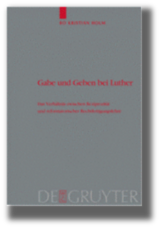
Bo Kristian Holm: Gabe und Geben bei Luther, Berlin – New York: de Gruyter, 2006
The author uses the cultural anthropological understanding of an ‘economy of the gift’ (reciprocity) to show how in Martin Luther’s writings, especially between 1518 and 1522, his doctrine of justification cannot be formulated without the idea of a re-established mutuality between God and man. Luther’s newly-gained understanding of mutuality enables him to develop his positive understanding of the Christian person and for the frequent parallels he draws between Christology and anthropology.
“Holms Lutherarbeit liest man […] mit großen gewinn“
Helmut Hoping in: Theologische Literaturzeitung 133 (2008)